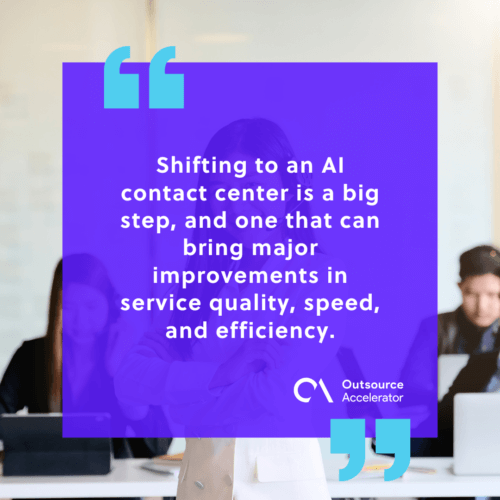A deep dive into AI contact center

Artificial intelligence (AI) refers to technology that can simulate human thinking and decision-making. It’s already molding how businesses operate, especially in customer service.
In a contact center environment, AI tools can handle tasks like routing calls, analyzing customer sentiment, and even answering basic inquiries. An AI chatbot can instantly respond to common support questions, saving agents time and helping customers faster.
Integrating artificial intelligence in a contact center combines this advanced technology with traditional customer service workflows. It results in a more efficient and responsive experience for both teams and customers.
In this article, we’ll take a closer look at what makes an AI contact center different, how it works, and why more businesses are turning to AI to improve performance, reduce costs, and meet rising customer expectations.
Day-to-day challenges of a traditional contact center
Running a traditional contact center can be demanding. With high volumes of calls, rising customer expectations, and growing pressure on teams, it’s easy for service quality to slip.
Below are some common hurdles that contact centers face daily:
High call volumes and long wait times
Agents often struggle to keep up with nonstop calls, especially during peak hours. Long hold times frustrate customers and lead to lower satisfaction. It also puts added stress on agents, making it harder to maintain consistent service levels.

Inconsistent customer experiences
Different agents may handle similar situations in different ways. Without real-time guidance or standardized processes, consistency becomes difficult.
This inconsistency affects how customers perceive the brand and can lead to repeated issues.
Agent burnout and high turnover
Contact center work is fast-paced and emotionally demanding. Repeating the same conversations, dealing with frustrated callers, and working under pressure can quickly lead to burnout.
As a result, staff turnover is often high, increasing recruitment and training costs.
Limited insights from customer interactions
Traditional systems often lack the tools to extract meaningful insights from calls and chats. Managers often overlook valuable data that could enhance performance, customer experience, and business strategy.
Difficulty scaling operations
As demand grows, scaling a traditional contact center becomes expensive and complex. Hiring and training new agents takes time, and expanding infrastructure adds to costs.
Given these ongoing challenges, many businesses are now exploring smarter alternatives. One solution gaining attention is the AI contact center, a modern approach that helps address many of these issues while improving overall efficiency.
In the next section, we’ll take a closer look at what this shift means for customer service.
What is an AI contact center?
An AI contact center uses artificial intelligence to enhance and automate various customer service processes. Unlike traditional setups, it combines machine learning, natural language processing, and real-time analytics to improve how support teams operate.
This modern solution supports agents, speeds up response times, and helps deliver more personalized customer experiences.
10 Essential elements of an AI contact center
An AI contact center transforms traditional customer support by combining automation, data analysis, and intelligent tools to improve both agent productivity and customer satisfaction.
With rising service expectations and the need for efficiency, businesses are turning to AI contact centers to handle high volumes of interactions across multiple channels.
Take note of the following elements that make an AI contact center effective and impactful:
1. AI-powered chatbots
Chatbots are often the first point of contact in an AI contact center. These virtual agents are trained to handle routine inquiries, provide accurate responses, and operate 24/7.
Whether it’s tracking an order, answering FAQs, or resetting a password, chatbots can resolve many customer issues without human intervention. This reduces wait times and frees up live agents to focus on more complex tasks.
Chatbots also help scale support during peak periods without the need for additional staff.
2. Intelligent call routing
AI contact centers use intelligent call routing to connect customers with the right agent the first time.
Instead of routing calls based on a fixed menu, AI analyzes real-time data such as:
- The customer’s language
- Inquiry type
- Emotional tone
Based on these details, AI will direct the call to the most appropriate agent or department. This results in shorter resolution times, fewer transfers, and a more satisfying customer experience.
3. Agent assist
Artificial intelligence doesn’t just help customers; it also supports agents in real time. Agent assist tools can:
- Suggest relevant knowledge base articles
- Offer recommended responses
- Surface customer history during live interactions
An AI-powered contact center reduces the time agents spend searching for information and allows them to focus on resolving issues quickly. The AI tool acts as a silent partner, guiding the agent through each interaction with useful, timely insights.
4. Automated quality assurance
Manual quality monitoring is time-consuming and often only covers a small percentage of interactions.
An AI contact center automates this process by continuously analyzing calls, chats, and emails to track performance metrics. It can identify trends, flag areas for improvement, and highlight top-performing agents.
Managers then gain a clear view of team performance and can utilize data-driven feedback to coach agents and enhance service levels.
5. Predictive analytics
Forecasting is critical in contact center operations. AI brings robust predictive capabilities by analyzing historical data to anticipate future patterns. It can predict peak call times, forecast staffing needs, and identify potential issues before they escalate.
For example, if a sudden spike in product complaints is detected, the system can alert managers and help them prepare additional resources. A proactive approach reduces disruptions and improves overall service quality.
6. Omnichannel support
Modern customers reach out through various platforms, including voice, chat, email, and social media, among others.
An AI contact center can unify all these channels into a single, manageable interface. Agents see every customer interaction in one place, regardless of the platform. This eliminates the need to switch between systems and helps provide consistent, seamless support.
It also gives teams a complete view of each customer’s journey for better communication and follow-up.
7. Personalized customer experience
Today’s customers expect more than just fast service; they want to feel understood. Artificial intelligence makes this possible by analyzing past interactions, preferences, and behavior to tailor each conversation.
Whether it’s addressing a customer by name, referencing a previous issue, or recommending products based on purchase history, personalization adds value to every interaction.
Meaningful, one-on-one experiences that build trust and loyalty emerge when an AI contact center wisely uses customer data.
8. Speech and text analytics
AI contact centers use advanced speech and text analytics to extract insights from conversations across all channels. These tools can detect tone, sentiment, keywords, and even silences or interruptions in real-time.
The extracted data helps supervisors to:
- Identify pain points
- Spot customer concerns early
- Refine support strategies
It also helps in measuring customer satisfaction and agent performance without relying solely on post-call surveys.
9. Natural Language Processing (NLP)
Natural Language Processing (NLP) allows AI systems to understand and respond to human language more naturally.
In an AI contact center, NLP powers virtual assistants, chatbots, and self-service tools to interpret customer intent accurately, even when questions are phrased in different ways. This results in smoother interactions and fewer misunderstandings.
NLP also supports multilingual services as it enables AI to interact with customers in multiple languages without requiring separate systems.
10. Workforce optimization
AI supports workforce optimization by analyzing agent schedules, workloads, and performance to provide real-time recommendations for staffing adjustments.
It can automatically adjust work schedules based on demand forecasts or alert managers when certain teams are under pressure.
This helps balance workloads, reduce agent fatigue, and improve service consistency across the board. Over time, it creates a more agile and responsive support environment.
Is your business ready for an AI contact center?
Shifting to an AI contact center is a big step, and one that can bring major improvements in service quality, speed, and efficiency. But before diving in, organizations must assess their readiness.

Jumping in without the right foundation can lead to missed opportunities or slow adoption. Here are a few tips to help determine if your business is ready for this transformation:
1. Evaluate your current challenges
Start by identifying pain points in your existing contact center:
- Are response times too slow?
- Do agents struggle with repetitive tasks?
- Are customers asking for more personalized support?
If these problems sound familiar, AI tools can help solve them.
2. Review your data quality
AI systems rely on accurate and organized data. Assess your current customer records, ticket histories, and communication logs. Clean, well-structured data leads to better AI performance and more reliable outcomes.
3. Analyze team readiness
Think about how open your team is to adopting new technology.
- Are your agents tech-savvy?
- Are managers willing to adjust workflows?
You don’t need every detail in place, but your team should be ready to experiment, learn, and adapt.
4. Set clear goals
Define what you want AI to improve. Whether it’s cutting wait times, reducing call volume, or helping agents work more efficiently, having a goal in mind gives your AI contact center purpose and direction.
Moving to an AI contact center can elevate your customer service and streamline daily operations. With the right preparation and clear objectives, your business can confidently take the next step toward smarter, faster support that meets modern customer expectations.







 Independent
Independent




